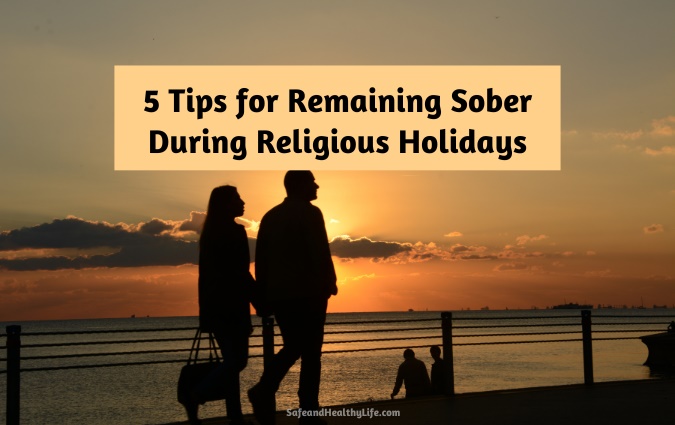5 Tips for Remaining Sober During Religious Holidays

Celebrations tend to be difficult for recovering addicts, but few more so than religious holidays. While there are religions that ban alcohol, others incorporate it into their customs or at least accept it as part of the festive spirit.
Easter comes at the end of Lent, a period of sacrifice during which many people temporarily stop drinking. As part of the rituals during the Passover meal, Jewish people drink four cups of wine.
The religious significance behind these occasions can make it more difficult to say no to family and friends offering you alcohol.
After all, you may feel anxious about potentially upsetting them, with some people unable to accept that something encouraged by their religion might not be good for everyone.
Getting through these occasions while remaining sober is tricky, but it can certainly be done.
Here are some tips for remaining sober during religious holidays.
1. Minimize your exposure
You will probably have to go to some events but try and avoid as many as possible. This may require you to step on a few toes.
There is a tricky balance to find, recognizing which people will be least offended and who you simply can’t afford to snub.
However, remember that your sobriety is worth a lot more than the comfort of someone unwilling to empathize with you.
The reality that you may have to sacrifice time with your family is disappointing. But if they are going to make it difficult for you to stay sober, how fulfilling can that time actually be?
Furthermore, if it does lead to a relapse, you will regret it far more. Rather find time to spend with your family at less pressurized times.
2. Hold onto a non-alcoholic drink
If you do have to be at events where you might be encouraged to drink, there are some steps you can take to safeguard yourself. One of the oldest tricks in the book is to nurse a non-alcoholic drink throughout the event.
By holding onto your drink, and occasionally taking a sip without disclosing what you’re drinking, you can avoid the constant offers of refills or replacements.
This does not guarantee that you’ll be given an easy time, but it does take some of the pressure off.
3. Stick with your closest friends or family members
Chances are that most of the people attending an event will not know about your sobriety. You don’t have to go around telling them about it.
The key is to find those people who know about and respect your recovery and stick with them.
They won’t put you in the position of having to say no over and over again. They will also provide a buffer when someone else offers a drink.
You can also rely on these people to remind you of what’s important if you start craving a drink. They may not be about to grab a drink from your hand, but they can prevent you from getting that far, simply by being available to you.
4. Use substitutes when necessary
At a religious event like a Passover dinner, one is expected to drink four glasses of wine as part of the ritual. Everyone at the table will be doing so, and you may not want to appear disrespectful.
In these cases, find a substitute that doesn’t compromise your sobriety. On Passover, for example, you can drink grape juice rather than wine and still fulfill the requirements of the night.
Very few – if any – religious rituals are going to force you to break your sobriety. Find out in advance what you can do as an alternative that won’t rock the boat too much.
Ultimately, even if there is no available alternative and people will see your refusal as disrespectful, you have to put yourself first.
Your sobriety is more important than other people’s skewed moral sensibilities. When it comes down to it, no religion wants people to relapse.
5. Create your own traditions
Many progressive families are happy to take their traditions in a new direction that accommodates everyone. If your family and friends are like this, consider creating your own traditions that celebrate your recovery along with the holiday.
If you enjoy hosting, you can provide a fun and fulfilling alternative to events that would otherwise trigger you.
Religious holidays can be a minefield when you are recovering from addiction. The above tips will help you get through the period without relapsing.
About The Author:
Dr. Boris Vaisman, MD, is a Family Medicine Specialist in Woodland Hills, CA. He graduated from the Ross University School of Medicine in 2003. He is affiliated with West Hills Hospital & Medical Center and specializes in Emergency Medicine and Family Medicine. He has unique insight into mood and behavioral disorders. He also writes blog posts about mental health and addiction. He has contributed many resources and research to substance abuse treatment centers and addiction treatment centers.

